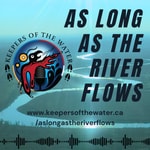As Long As The River Flows – Details, episodes & analysis
Podcast details
Technical and general information from the podcast's RSS feed.

As Long As The River Flows
Keepers of the Water
Frequency: 1 episode/15d. Total Eps: 35

Recent rankings
Latest chart positions across Apple Podcasts and Spotify rankings.
Apple Podcasts
🇨🇦 Canada - naturalSciences
26/07/2025#98🇨🇦 Canada - naturalSciences
25/07/2025#84🇨🇦 Canada - naturalSciences
24/07/2025#71🇨🇦 Canada - naturalSciences
23/07/2025#55🇨🇦 Canada - naturalSciences
22/07/2025#30🇨🇦 Canada - naturalSciences
21/07/2025#90🇨🇦 Canada - naturalSciences
20/07/2025#72🇨🇦 Canada - naturalSciences
19/07/2025#63🇨🇦 Canada - naturalSciences
18/07/2025#49🇨🇦 Canada - naturalSciences
17/07/2025#40
Spotify
No recent rankings available
Shared links between episodes and podcasts
Links found in episode descriptions and other podcasts that share them.
See all- https://www.youtube.com/channel
941 shares
- https://www.youtube.com/channel/
404 shares
- https://breakingcopyright.com
110 shares
- https://haydenfolkermusic.com
4 shares
- https://fb.watch/snnqakgZXc/
1 share
RSS feed quality and score
Technical evaluation of the podcast's RSS feed quality and structure.
See allScore global : 63%
Publication history
Monthly episode publishing history over the past years.
Health Impacts of Uranium Mining on Indigenous Bodies
Episode 7
mardi 23 juillet 2024 • Duration 26:41
Uranium Mining in Northern Saskatchewan: What You Need To Know Part 3―Health Impacts of Uranium Mining on Indigenous Bodies
Join host Beverly Andrews, Dr. Dale Dewar, and Professor Douglas Brugge for a deeper dive into information on the human health impacts of uranium mining.
Dr. Dale Dewar is a co-author with Florian Oelck of From Hiroshima to Fukushima to You. She is an associate professor in the Department of Family Medicine at the University of Saskatchewan, an active member of the International Committee of the Society of Rural Physicians of Canada, a two-term member of the Canadian Friends Service Committee, and the former Executive Director of Physicians for Global Survival. An anti-nuclear activist since the 1980s, she has published articles and spoken at conferences about nuclear proliferation.
Douglas Brugge, Professor & Chair at the Department of Public Health Sciences at the University of Connecticut School of Medicine - Doug Brugge has a Ph.D. in cellular and developmental biology from Harvard University and an MS in industrial hygiene from the Harvard School of Public Health. He is Professor and Chair of the Department of Public Health Sciences at the University of Connecticut School of Medicine. For over a decade, he has directed the Community Assessment of Freeway Exposure and Health, a series of community-based participatory research projects funded by NIEHS, NHLBI, NLM, EPA, HUD and the Kresge Foundation. CAFEH has about 200 publications, including over 50 on traffic-related ultrafine particle pollution and their association with health. He has worked in community collaborations with many neighbourhoods.
This podcast episode was edited and produced by Beverly Andrews.
This podcast was created from a live-stream webinar previously broadcast on Keepers of the Water's YouTube and Facebook channels on February 27th, 2024
Uranium Mining in Northern Saskatchewan | Part 2: Small Nuclear Modular Reactors (SMRs) and Consent in Saskatchewan: What You Haven’t Been Told
Episode 6
jeudi 13 juin 2024 • Duration 20:02
Uranium Mining in Northern Saskatchewan―What You Need To Know; Part 2, Small Nuclear Modular Reactors (SMRs) and Consent in Saskatchewan: What You Haven’t Been Told
Originally broadcast as a live-to-air online webinar, this four-part series was shortened to audio for your listening pleasure. We want to help you learn more about uranium mining in Northern Saskatchewan, why it is happening, and what the future looks like for Indigenous Peoples and allies resisting uranium mining and nuclear waste in their traditional territories.
Tori Cress hosts this episode's guests, including Paul Belanger, Keepers of the Water Science Advisor. Dr. Gordon Edwards, President and co-founder of the Canadian Coalition for Nuclear Responsibility, and Benjamin Ralston BA, JD, LLM, Assistant Professor at the College of Law, University of Saskatchewan. Between our guests, you will gain decades of combined knowledge of uranium extraction and nuclear energy. You can watch the original broadcast on Facebook and YouTube. Please note the YouTube video is of lower quality due to connectivity issues during the live broadcast.
In this episode, we will hear from Dr. Gordon Edwards, president and co-founder of the Canadian Coalition for Nuclear Responsibility. Dr. Edwards is dedicated to education and research on all issues related to nuclear energy, whether civilian or military, including non-nuclear alternatives. A retired professor of mathematics and science at Vanier College, Doctor Edwards has also served as a consultant on nuclear issues for governmental and non-governmental bodies for over 45 years. He has been accepted as an expert witness by US and Canadian courts and tribunals, has cross-examined nuclear experts during provincial commissions of inquiry, and has been invited to address various countries.
Nuclear energy is not clean energy that will save us from the climate crisis. This false solution is being sold to citizens by the same industries that are the source of the climate problem. Nuclear power, including SMRs, is not a climate solution because it is filthy to mine, physically dangerous, too expensive and very slow.
The rise of nuclear energy as a solution to the climate crisis is a looming threat to clean, fresh water for the entire planet. Current extraction practices and policies have brought us to this global crisis, and colonial practices are not how we save ourselves from ourselves. Natural law shows us that we are not separate from our environment, and the time to pay attention to that teaching is now.
This episode was edited and produced by Beverly Andrews.
Uranium Mining in Northern Saskatchewan―What You Need To Know: Part 1, Indigenous Resistance to Uranium Mining
Episode 5
mercredi 29 mai 2024 • Duration 17:08
Uranium Mining in Northern Saskatchewan―What You Need To Know:
Part 1, Indigenous Resistance to Uranium Mining
Originally broadcast as a live-to-air online webinar, this four-part series was shortened to audio for your listening pleasure. We want to help you learn more about uranium mining in Northern Saskatchewan, why it is happening, and what the future looks like for Indigenous Peoples resisting uranium mining and nuclear waste in their traditional territories.
Beverly Andrews hosts this episode's guests, including Leona Morgan and Candyce Paul. Between our guests, you will gain decades of combined knowledge of uranium and nuclear Indigenous resistance warriors on the frontline of water, land and traditional knowledge protection. You can watch the original broadcast on Facebook and YouTube. Please note the YouTube video is lower quality due to connectivity issues during the live broadcast.
We will specifically address the impact of uranium mining on indigenous communities, shedding light on a crucial aspect of this issue. While many people have been busy in survival mode and exhausted from the pandemic, wars around the world, and extreme inflation, uranium mining lobbyists and governments have been taking advantage, passing industry-favourable laws that will further degrade and threaten freshwater systems already desperately overburdened by farming and mining use and wastewater byproducts.
Nuclear energy is not clean energy that will save us from the climate crisis. This false solution is being sold to citizens by the same industries that are the source of the climate problem. Nuclear power, including SMRs, is not a climate solution because it is filthy to mine, physically dangerous, too expensive and very slow.
The rise of nuclear energy as a solution to the climate crisis is a looming threat to clean, fresh water for the entire planet. Current extraction practices and policies have brought us to this global crisis, and colonial practices are not how we save ourselves from ourselves. Natural law shows us that we are not separate from our environment, and the time to pay attention to that teaching is now.
This episode was edited and produced by Beverly Andrews.
Episode 4ㅡBear Teachings on Natural Law, Parenting and Living in a Good Way
Episode 4
mercredi 8 mai 2024 • Duration 21:27
Live-streamed initially on December 2, 2020, the Indigenous Bear Teachings webinar with Daphie Pooyak, Dr. Jeff Lewis, and Jeff Wastesicott was moderated by our executive director, Jesse Cardinal. Keepers of the Water, kâniyâsihk Culture Camps, Indigenous Knowledge & Wisdom Centre, and Indigenous Climate Action produced this collaborative webinar.
Numerous species of bears can be found across so-called Canada, and many Indigenous communities and Nations have lived side-by-side with bears. In this podcast episode, we hear from Daphie Pooyak and Jeff Wastesicoot on Traditional Cree Bear teachings.
Daphie Pooyak, a Nakota Cree traditional teacher and cultural advisor, hails from Sweetgrass First Nation in central Saskatchewan. Her personal journey, spanning two decades of professional education in cultural education and land-based learning, is a testament to her unwavering dedication. Her work in addictions, healing, and trauma further underscores her commitment to her community.
Jeff Wastesicoot, a proud member of the Pimickamack Cree Nation (Cross Lake, Manitoba), is not just a language consultant and knowledge Keeper. His personal dedication to helping people overcome personal challenges through ceremonies, traditional medicines, and counselling is truly inspiring. His life's work is a testament to preserving the Nehiyew language and culture.
As Indigenous People, we embody a truly remarkable resilience. Despite the disruptive forces of colonization and residential schools, we are steadfastly reclaiming our identities. Our collective desire to learn our language and songs, participate in ceremonies, and reconnect with the land is a powerful testament to our strength and a source of inspiration for all. As an environmental organization, Keepers of the Water witnesses the far-reaching impacts of the industry across our vast territorial homelands, naturally fueling our determination to protect them.
Through this podcast, we amplify the voices of those who carry the Indigenous Knowledge, a beacon of hope guiding us towards a clean and just transition to a fossil-free world. Indigenous People’s traditional Knowledge, deeply rooted in countless generations of storytellers, is not just a key but the key to the leading solutions to climate change. It is a testament to our collective history of resilience in the face of climate challenges.
This episode was edited and produced by Beverly Andrews.
Living in Balance through Traditional Moose Teachings - Episode 3
Episode 3
vendredi 5 avril 2024 • Duration 25:07
Beyond their ecological significance, moose hold a unique place in the hearts of many Indigenous communities as revered water beings. In this episode, our executive director, Jesse Cardinal, hosts a conversation with Jeff Wastesicoot and Dr. Kevin Lewis, who share their profound Cree moose teachings and experiences of living in harmony with these majestic creatures.
The loss of the moose's habitat is not just an ecological concern, it's a pressing water protection issue. The rampant clear-cutting and muskeg clearing are decimating their homes. This episode aims to bridge the knowledge gap by exploring the identity of the moose and our intricate relationship with this animal, highlighting the urgent need for action. Join us as we delve deeper into this crucial topic.
We want to acknowledge the collaborative effort that went into producing this episode. Some of the audio was pulled from a live webinar co-hosted by ourselves, kâniyâsihk Culture Camps, Indigenous Knowledge & Wisdom Centre, and Indigenous Climate Action. The webinar, originally recorded on October 21, 2020, featured the Indigenous Moose Teachings with Jeff Wastesicoot and Kevin Lewis, moderated by Jesse Cardinal and Board of Director member Cleo Reece. This collective effort is a testament to our shared commitment to environmental education and advocacy.
As Indigenous People, we embody remarkable resilience and unwavering determination, and we profoundly understand our connection to the land, water, animals, and plants. Despite the disruptive forces of colonization and residential schools, we are reclaiming our identities. The desire to learn our language and songs, participate in ceremonies, and reconnect with the land is a testament to our strength. As an environmental organization, Keepers of the Water witnesses the far-reaching impacts of the industry across our vast territorial homelands, naturally fueling our determination to protect them.
Through this podcast, we amplify the voices of those who carry the Indigenous Knowledge, a beacon of hope guiding us towards a clean and just transition to a fossil-free world. Our traditional knowledge, deeply rooted in countless generations of storytellers, is not just a key but the key to the leading solutions to climate change. It is a testament to our collective history of resilience in the face of climate challenges.
Through this podcast, we amplify the voices of those who carry the Indigenous Knowledge, a beacon of hope guiding us towards a clean and just transition to a fossil-free world. Our traditional knowledge, deeply rooted in countless generations of storytellers, is not just a key but the key to the leading solutions to climate change. It is a testament to our collective history of resilience in the face of climate challenges.
This episode was edited and produced by Beverly Andrews.
We've Been Here Before―Returning to the Land for Healing is Climate Change Direct Action with Dr. Kevin Lewis
Episode 2
mercredi 28 février 2024 • Duration 27:01
Denesuline, The People of the Land and the Paulette Case with Elder François Paulette
Episode 1
mardi 27 février 2024 • Duration 24:26
Welcome to As The River Flows Podcast!
With this podcast, we hope to uplift the collective work and voices of our communities in the protection of water. We are First Nation, Métis, Inuit, environmental groups, and concerned citizens working together for the protection of water, air, and land. We acknowledge that all water is connected and that water is sacred.
This episode features François Paulette, Denesuline from Smith's Landing First Nation, Treaty 8. An advocate of Treaty and Indigenous rights. He has spoken to international audiences on human rights, spiritual healing from colonial oppression, and environmental protection. In this episode, François speaks to us about the historic Paulette Case (PAULETTE v. THE QUEEN), which was the filing of a legal caveat concerning the different interpretations of Treaty 8 and Treaty 11 between the Government of Canada and the Denesoline in the Northwest Territories.
On September 6th, 1973, Justice Morrow found that the Dene “are the prima facie owners of the lands covered by the caveat – that they have what is known as aboriginal rights.” He also found that “notwithstanding the language of the two Treaties, there is sufficient doubt on the facts that aboriginal title was extinguished that such claim for the title should be permitted to be put forward by the caveators.”
Although the case was dismissed in the Supreme Court of Canada on a technicality, it was a significant step forward in the collective fight for Indigenous Rights.
Clean, fresh water is invaluable for our shared future and the survival of all of the life we share this incredible planet with. There is hope before us through Indigenous Knowledge applied to our daily lives.
This episode was edited and produced by Beverly Andrews.
Part one - Dene Nation Speaks Out on the 2023 Wildfires Devastation and Why An Independent Inquiry Is Needed
Season 1 · Episode 8
vendredi 17 janvier 2025 • Duration 18:57
WHAT - 2023 was an unprecedented year for wildfires in the NWT with almost 70% of the population being evacuated to communities across the NWT and western Canada.
A state of emergency was called and 13 communities including Behchoko, Fort Smith, Salt River First Nation, Smith Landing First Nation, Jean Marie River, West Point First Nation, Hay River, K'atl'odeeche First Nation, Enterprise, Ndilǫ, Dettah, Yellowknife and Kakisa were evacuated.
The Dene Nation calls for the full independent public inquiry to begin as soon as possible. Dene authority and governance must be recognized
and included in all response plans going forward.
This podcast was created from the WEBINAR: Dene Nation Speaks Out on the 2023 Wildfires Devastation and Why An Independent Inquiry Is Needed which was streamed live on Mar 11, 2024
Part one - Moderator Bill Erasmus introduces The Dene Nations request for an inquiry into the 2023 Wildfires, then opening remarks are delivered by Dene National Chief Gerald Antoine and panel speaker Francois Paulette discusses climate change and the need for traditional knowledge protocols.
Bill Erasmus- Mr. Erasmus was born in Yellowknife in 1954, and has spent much of his career in his homeland Denendeh. He acquired a Bachelor of Arts Degree in Political Science from the University of Alberta. Chief Erasmus’ political expertise and strong leadership skills have brought significant change and advancement to all Peoples of the NWT (North West Territories).
Gerald Antoine is the Dene National Chief and he was raised in a traditional Dene way in a community called Rabbit Skin. When he first left his home community, he went to Fort Simpson, where there was an administrative centre, residential schools, a day school and he later ended up in foster care. Antoine was motivated to learn more about his culture, language, worldview and social context after living through those experiences.
Francois Paulette - A Denesuline and member of the Smith’s Landing Treaty 8 First Nation Francois Paulette survived the residential school system before going on the become the youngest Chief in the NWT Indian Brotherhood in 1971.
Music: Autumn [Original Mix] by Imperss is licensed under a Creative Commons License.
https://creativecommons.org/licenses/...
Support by RFM - NCM: https://bit.ly/2xGHypM
Part 2 - Dene Nation Speaks Out on the 2023 Wildfires Devastation and Why An Independent Inquiry Is Needed
Season 1 · Episode 9
jeudi 23 janvier 2025 • Duration 19:07
WHAT - 2023 was an unprecedented year for wildfires in the NWT with almost 70% of the population being evacuated to communities across the NWT and western Canada.
A state of emergency was called and 13 communities including Behchoko, Fort Smith, Salt River First Nation, Smith Landing First Nation, Jean Marie River, West Point First Nation, Hay River, K'atl'odeeche First Nation, Enterprise, Ndilǫ, Dettah, Yellowknife and Kakisa were evacuated.
The Dene Nation calls for the full independent public inquiry to begin as soon as possible. Dene authority and governance must be recognized
and included in all response plans going forward.
This podcast was created from the WEBINAR: Dene Nation Speaks Out on the 2023 Wildfires Devastation and Why An Independent Inquiry Is Needed which was streamed live on Mar 11, 2024
Part two - Moderator Bill Erasmus recaps the Dene Nations call for an Independent inquiry into the 2023 Wildfires, then Chief Fred Sangrias speaks on his experiences during the wildfire as well as the need to train Dene people to fight fires to protect their own communities.Next, Jesse Cardinal recaps the webinar and introduces Chief David Etchinelle speak first in his Dene language and then speaks of the devastation on wildlife and the importance of traditional knowledge, as well as people in his community having to evacuate at their own cost.
Bill Erasmus - Mr. Erasmus was born in Yellowknife in 1954, and has spent much of his career in his homeland Denendeh. He acquired a Bachelor of Arts Degree in Political Science from the University of Alberta. Chief Erasmus’ political expertise and strong leadership skills have brought significant change and advancement to all Peoples of the NWT (North West Territories).
Chief Fred Sangris - was born in the Yellowknife Bay area to parents Morris (Tia Chee) and Theresa Sangris Nee’ Black and grandfather, David (olter’caulther) Kamelli Sangris – grandson of the famous 1860 chief of the Coppermine River, Nayatii. Fred is a part of the long-standing leadership from the Kemili/Sangris family lineage and is a direct descendant of Chief Nayatii of the Copper Mine River and the edge of the wood Yellowknives Dene.
Chief David Echinelle - Is a traditional Chief from Begade Shotagotine, he is a traditional knowledge keeper and respected Elder, who has worked to advocate for the rights and protection of Dene lands, language and cultural practices.
Music: "Hayden Folker - Elegy Of Dusk" is under a Creative Commons (CC BY 3.0) license:
http://creativecommons.org/licenses/b...
https://haydenfolkermusic.com
Part 3 - Dene Nation Speaks Out on the 2023 Wildfires Devastation and Why An Independent Inquiry Is Needed
Season 1 · Episode 10
jeudi 30 janvier 2025 • Duration 24:29
WHAT - 2023 was an un10recedented year for wildfires in the NWT with almost 70% of the population being evacuated to communities across the NWT and western Canada.
A state of emergency was called and 13 communities including Behchoko, Fort Smith, Salt River First Nation, Smith Landing First Nation, Jean Marie River, West Point First Nation, Hay River, K'atl'odeeche First Nation, Enterprise, Ndilǫ, Dettah, Yellowknife and Kakisa were evacuated.
The Dene Nation calls for the full independent public inquiry to begin as soon as possible. Dene authority and governance must be recognized
and included in all response plans going forward.
This podcast was created from the WEBINAR: Dene Nation Speaks Out on the 2023 Wildfires Devastation and Why An Independent Inquiry Is Needed which was streamed live on Mar 11, 2024
Part three - In Part Three Trevor Teed starts off speaking on his experience as both an evacuee and an employee of Dene Nation dealing with the Territorial Government during evacuation and the Red Cross at the evacuee centre in Edmonton. Then Jesse Cardinal of Keepers of the Water opens the webinar to other Chiefs on the call who would like to speak to their experiences. Grand Chief Wilbert Kochon of the Sahtu speaks on the lasting impacts on his community from the 2023 wildfires and the lack of experience of those leading the evacuation efforts for the GNWT. Jesse Cardinal recaps other speakers emphasis on the long standing effects of climate change including fires and drought, Dene Nation employees Wilbert Cook and Sam Bullock speak on the lack of organization and the effects on the evacuees. Then Chief Frank Andrew of Toledo wraps up part three with his communities experiences during the 2023 wildfires and the importance of recognizing climate change and it’s part in the 2023 wildfires.
Grand Chief Wilbert Kochon - Sahtu Dene Council Grand Chief and Dene Nation executive member
Chief Frank Andrew - was re-elected for another four-year term as chief of the Tulita Dene Band, in 2021
Trevor Teed - Lands and Environment director at Dene Nation, an evacuee and a Dene Nation employee who helped with evacuee response.
Wilbert Cook - Director of Housing at Dene Nation, an evacuee and a Dene Nation employee who helped with evacuee response.
Sam Bullock - Director of Fisheries at Dene Nation, an evacuee and a Dene Nation employee who helped with evacuee response.
Music: this too shall pass by Scott Buckley – released under CC-BY 4.0. www.scottbuckley.com.au









